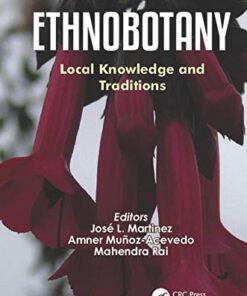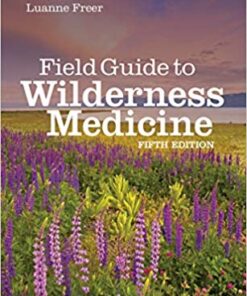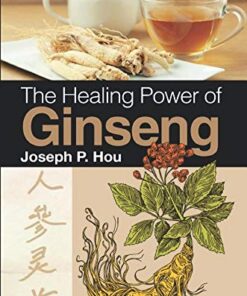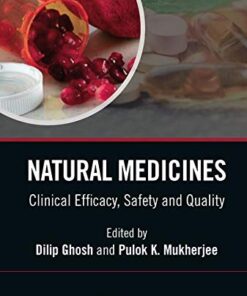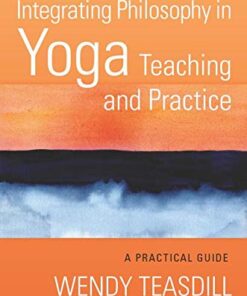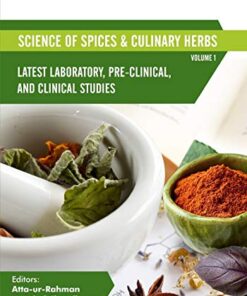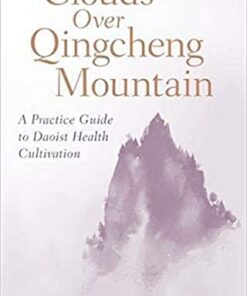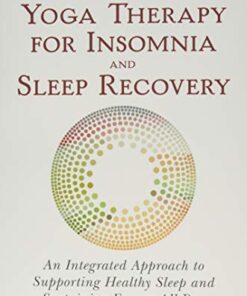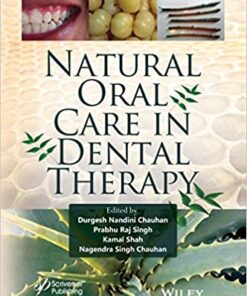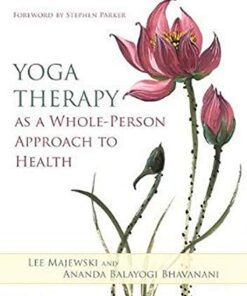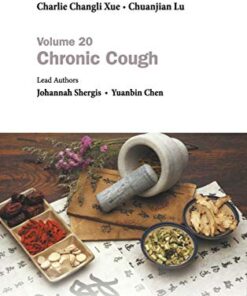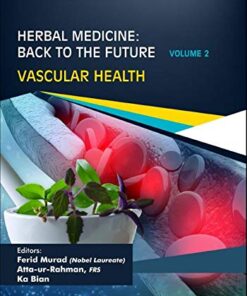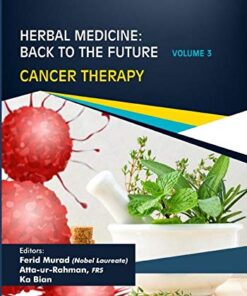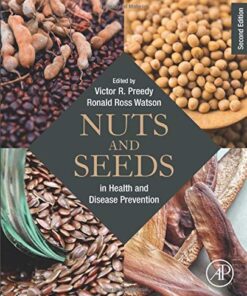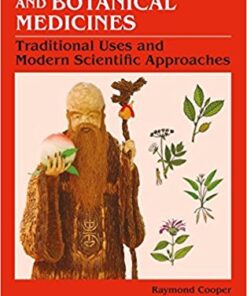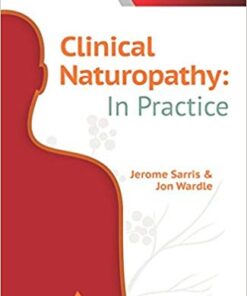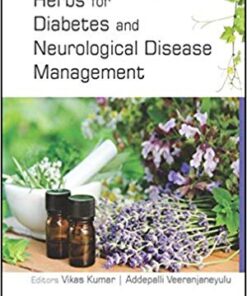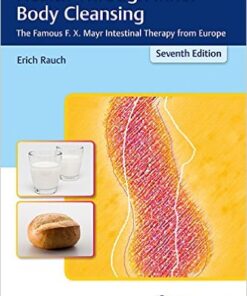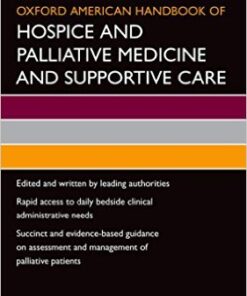NATURAL & TRADITIONAL MEDICINE BOOKS
NATURAL & TRADITIONAL MEDICINE BOOKS
Field Guide to Wilderness Medicine, 5th Edition (ORIGINAL PDF from Publisher)
NATURAL & TRADITIONAL MEDICINE BOOKS
NATURAL & TRADITIONAL MEDICINE BOOKS
NATURAL & TRADITIONAL MEDICINE BOOKS
Integrating Philosophy in Yoga Teaching and Practice (Original PDF from Publisher)
NATURAL & TRADITIONAL MEDICINE BOOKS
NATURAL & TRADITIONAL MEDICINE BOOKS
Clouds Over Qingcheng Mountain (Original PDF from Publisher)
NATURAL & TRADITIONAL MEDICINE BOOKS
Yoga Therapy for Insomnia and Sleep Recovery (Original PDF from Publisher)
NATURAL & TRADITIONAL MEDICINE BOOKS
Natural Oral Care in Dental Therapy 1st Edition (Original PDF From Publisher)
NATURAL & TRADITIONAL MEDICINE BOOKS
Antimicrobial Potential of Essential Oils (Original PDF from Publisher)
NATURAL & TRADITIONAL MEDICINE BOOKS
Yoga Therapy as a Whole-Person Approach to Health (Original PDF from Publisher)
NATURAL & TRADITIONAL MEDICINE BOOKS
Evidence-Based Clinical Chinese Medicine – Volume 20: Chronic Cough (Original PDF from Publisher)
NATURAL & TRADITIONAL MEDICINE BOOKS
Herbal Medicine: Back to the Future: Volume 2, Vascular Health (Original PDF from Publisher)
NATURAL & TRADITIONAL MEDICINE BOOKS
Herbal Medicine: Back to the Future: Volume 3, Cancer Therapy (Original PDF from Publisher)
NATURAL & TRADITIONAL MEDICINE BOOKS
Nuts and Seeds in Health and Disease Prevention, 2nd Edition (Original PDF from Publisher)
NATURAL & TRADITIONAL MEDICINE BOOKS
Chinese and Botanical Medicines: Traditional Uses and Modern Scientific Approaches (PDF)
NATURAL & TRADITIONAL MEDICINE BOOKS
NATURAL & TRADITIONAL MEDICINE BOOKS
NATURAL & TRADITIONAL MEDICINE BOOKS
NATURAL & TRADITIONAL MEDICINE BOOKS
Herbs and Natural Supplements, Volume 2: An Evidence-Based Guide 4th Edition PDF
NATURAL & TRADITIONAL MEDICINE BOOKS
NATURAL & TRADITIONAL MEDICINE BOOKS
Clinical Naturopathy: An evidence-based guide to practice 2nd Edition PDF
NATURAL & TRADITIONAL MEDICINE BOOKS
Pocket Atlas of Acupuncture and Trigger Points 1st Edition PDF
NATURAL & TRADITIONAL MEDICINE BOOKS
Herbs for Diabetes and Neurological Disease Management: Research and Advancements 1st Edition PDF
NATURAL & TRADITIONAL MEDICINE BOOKS
Evidence-based Research Methods for Chinese Medicine Kindle Edition
NATURAL & TRADITIONAL MEDICINE BOOKS
The Psychiatry of Palliative Medicine: The Dying Mind Kindle Edition
NATURAL & TRADITIONAL MEDICINE BOOKS
Principles of Ear Acupuncture: Microsystem of the Auricle Kindle Edition
NATURAL & TRADITIONAL MEDICINE BOOKS
NATURAL & TRADITIONAL MEDICINE BOOKS
NATURAL & TRADITIONAL MEDICINE BOOKS
Introduction
Are you looking for a comprehensive guide to holistic healing? Discover the Benefits of Natural & Traditional Medicine Books: A Guide to Holistic Healing is an essential resource for anyone interested in exploring the world of natural and traditional medicine. This book provides readers with an overview of the various types of holistic healing, including herbal remedies, homeopathy, acupuncture, and more. It also offers advice on how to choose the right type of treatment for your individual needs. With this book, you can learn about the benefits of natural and traditional medicine, as well as how to incorporate these treatments into your daily life. Whether you are looking to improve your overall health or just want to explore alternative forms of healing, this book is sure to provide you with the information you need.
Introduction to Natural & Traditional Medicine: What It Is and How It Can Help You
Introduction to Natural & Traditional Medicine: What It Is and How It Can Help You
Natural and traditional medicine is an ancient form of healing that has been used for centuries. It is based on the belief that the body has the ability to heal itself, and that certain natural substances can be used to help promote this process. Natural and traditional medicine is a holistic approach to health care, which means it takes into account the whole person – their physical, mental, emotional, and spiritual well-being.
Natural and traditional medicine is often referred to as “alternative” or “complementary” medicine, because it is used in addition to conventional medical treatments. It includes a variety of practices such as herbalism, acupuncture, homeopathy, naturopathy, and massage therapy. These therapies are used to treat a wide range of conditions, from minor ailments to chronic illnesses.
The goal of natural and traditional medicine is to restore balance and harmony within the body. This is done by addressing the underlying causes of illness, rather than just treating the symptoms. Natural and traditional medicine practitioners believe that the body has an innate ability to heal itself, and that certain natural substances can be used to support this process.
Herbalism is one of the oldest forms of natural and traditional medicine. Herbal remedies are made from plants and plant extracts, and have been used for centuries to treat a variety of ailments. Herbalists use herbs to treat both physical and mental health issues, and they may also recommend lifestyle changes to help improve overall health.
Acupuncture is another form of natural and traditional medicine. It involves inserting thin needles into specific points on the body to stimulate the flow of energy, or qi. Acupuncture is believed to help restore balance and harmony within the body, and is used to treat a variety of conditions, including pain, digestive problems, and stress.
Homeopathy is a system of natural medicine that uses very small doses of natural substances to stimulate the body’s own healing response. Homeopathic remedies are believed to work by stimulating the body’s natural defenses, and are used to treat a wide range of conditions, from allergies to depression.
Naturopathy is a holistic approach to health care that focuses on prevention and self-care. Naturopathic doctors use a variety of natural therapies, such as nutrition, herbal medicine, and lifestyle counseling, to help patients achieve optimal health.
Massage therapy is another form of natural and traditional medicine. Massage therapists use various techniques to manipulate the soft tissues of the body, such as muscles, tendons, and ligaments. Massage therapy is believed to help reduce stress, improve circulation, and relieve pain.
Natural and traditional medicine can be a powerful tool for improving your health and wellbeing. By combining these therapies with conventional medical treatments, you can create a comprehensive plan for achieving optimal health.
Exploring the Different Types of Natural & Traditional Medicine
Natural and traditional medicine are two distinct forms of healthcare that have been used for centuries to treat a variety of ailments. Natural medicine is based on the use of natural substances, such as herbs, minerals, and plants, to treat illnesses and promote health. Traditional medicine, on the other hand, is based on the beliefs and practices of a particular culture or region.
Natural medicine has been used for thousands of years to treat a wide range of conditions, from minor aches and pains to serious illnesses. Herbal remedies, homeopathy, aromatherapy, and acupuncture are all examples of natural medicine. Herbal remedies involve the use of plants and their extracts to treat various ailments. Homeopathy is a system of medicine that uses very small doses of natural substances to stimulate the body’s own healing powers. Aromatherapy involves the use of essential oils to promote relaxation and reduce stress. Acupuncture is an ancient Chinese practice that involves inserting needles into specific points on the body to relieve pain and improve overall health.
Traditional medicine is based on the beliefs and practices of a particular culture or region. It is often passed down through generations and can include a variety of treatments, such as herbal remedies, massage, and spiritual healing. In some cultures, traditional medicine is still widely practiced and is seen as a more holistic approach to healthcare.
Both natural and traditional medicine can be effective in treating a variety of conditions. However, it is important to remember that these forms of medicine should not be used in place of conventional medical care. If you are considering using either natural or traditional medicine, it is important to speak with your doctor first to ensure that it is safe and appropriate for your condition.
Understanding the Benefits of Natural & Traditional Medicine
Natural and traditional medicine have been used for centuries to treat a variety of ailments. These forms of medicine are based on the belief that the body has an innate ability to heal itself, and that certain natural substances can be used to help facilitate this healing process. Natural and traditional medicine is often seen as a more holistic approach to health care, as it takes into account the whole person rather than just treating the symptoms of a particular illness or condition.
The benefits of natural and traditional medicine are numerous. For starters, these forms of medicine are typically much less expensive than conventional treatments. Additionally, they are often safer and more effective than many of the drugs and procedures used in modern medicine. Natural and traditional medicines also tend to be gentler on the body, with fewer side effects than many pharmaceuticals.
Another benefit of natural and traditional medicine is that it can be tailored to the individual needs of each patient. This means that practitioners can create personalized treatment plans that address the specific needs of each person. This type of personalized care can be especially beneficial for those suffering from chronic conditions, as it allows practitioners to focus on the underlying causes of the illness rather than simply treating the symptoms.
Finally, natural and traditional medicine can provide a sense of empowerment to patients. By taking control of their own health, patients can feel more confident in their ability to manage their own health and well-being. This can lead to improved mental and emotional health, as well as physical health.
Overall, natural and traditional medicine offer a wide range of benefits to those who choose to use them. From cost savings to improved health outcomes, these forms of medicine can be an invaluable part of any health care plan.
Finding the Right Natural & Traditional Medicine Practitioner for You
Finding the right natural and traditional medicine practitioner for you can be a daunting task. With so many different practitioners available, it can be difficult to know which one is best suited to your needs. To help make the process easier, here are some tips on how to find the right natural and traditional medicine practitioner for you.
First, consider what type of natural and traditional medicine you are looking for. Different practitioners specialize in different areas, such as herbalism, acupuncture, homeopathy, naturopathy, and more. Knowing what type of treatment you need will help narrow down your search.
Second, research the practitioners in your area. Look for reviews online or ask friends and family for recommendations. Make sure to read up on the practitioner’s credentials and experience to ensure they are qualified to provide the services you need.
Third, schedule an initial consultation with the practitioner. This is a great opportunity to get to know them and discuss your health concerns. During the consultation, ask questions about their approach to natural and traditional medicine, their experience, and any other information that may be relevant to your situation.
Fourth, consider the cost of the services. Natural and traditional medicine can be expensive, so make sure you understand the fees associated with the practitioner’s services before committing to anything.
Finally, trust your instincts. If you feel comfortable with the practitioner and believe they are the right fit for you, then go ahead and book an appointment.
Finding the right natural and traditional medicine practitioner for you can take time and effort, but it is worth it in the end. By following these tips, you can be sure to find the practitioner who is best suited to your needs.
Incorporating Natural & Traditional Medicine into Your Everyday Life
Incorporating natural and traditional medicine into your everyday life can be a great way to improve your overall health and wellbeing. Natural and traditional medicine is an ancient form of healing that has been used for centuries to treat a variety of ailments. It is based on the belief that the body has an innate ability to heal itself, and that certain herbs, plants, and other natural substances can help to facilitate this process.
Natural and traditional medicine can be used to treat a wide range of conditions, from minor aches and pains to more serious illnesses. It is often used in conjunction with conventional medicine, as it can provide additional support and relief. Some of the most common forms of natural and traditional medicine include herbal remedies, acupuncture, massage therapy, homeopathy, and aromatherapy.
Herbal remedies are one of the oldest forms of natural and traditional medicine. Herbs have been used for centuries to treat a variety of ailments, from headaches to digestive issues. Many herbs have anti-inflammatory, antioxidant, and antimicrobial properties, which can help to reduce inflammation and boost the immune system. Common herbs used in natural and traditional medicine include ginger, turmeric, garlic, and echinacea.
Acupuncture is another popular form of natural and traditional medicine. This practice involves inserting thin needles into specific points on the body to stimulate the flow of energy and promote healing. Acupuncture is believed to help relieve pain, reduce stress, and improve overall health.
Massage therapy is another form of natural and traditional medicine. Massage therapy can help to reduce tension, improve circulation, and promote relaxation. It can also help to reduce stress and anxiety, improve sleep quality, and reduce muscle soreness.
Homeopathy is a form of natural and traditional medicine that uses small doses of natural substances to stimulate the body’s own healing processes. Homeopathic remedies are believed to be safe and effective, and can be used to treat a variety of conditions, including allergies, skin conditions, and digestive issues.
Aromatherapy is a form of natural and traditional medicine that uses essential oils to promote relaxation and healing. Essential oils are derived from plants and have a variety of therapeutic benefits, such as reducing stress, improving mood, and promoting better sleep.
Incorporating natural and traditional medicine into your everyday life can be a great way to improve your overall health and wellbeing. Whether you choose to use herbal remedies, acupuncture, massage therapy, homeopathy, or aromatherapy, these practices can help to reduce stress, improve circulation, and promote relaxation. If you are considering incorporating natural and traditional medicine into your life, it is important to speak to your doctor first to ensure that it is safe and appropriate for you.
Conclusion
In conclusion, Discover the Benefits of Natural & Traditional Medicine Books: A Guide to Holistic Healing is an invaluable resource for anyone looking to explore the world of holistic healing. This book provides readers with a comprehensive overview of natural and traditional medicine, including its history, benefits, and potential risks. It also offers practical advice on how to incorporate these practices into one's daily life. With its clear and informative writing style, this book is sure to be a valuable addition to any health-conscious individual's library.

